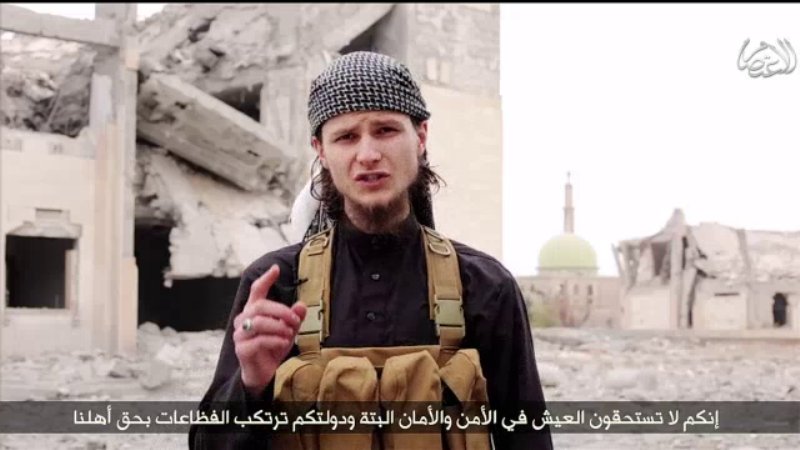An Ottawa-born jihadi said efforts to stop ISIS-wannabes, like himself, from leaving the country will only lead to “punishment” for Canadians.

John Maguire, a 24-year-old Muslim convert, appeared in a propaganda video released Sunday. He encouraged lone-wolf attacks on Canadian soil, like the ones carried out in Ottawa and Saint-Jean-sur-Richelieu, Que., in October, in response to Canada’s involvement in airstrikes against ISIS targets in Iraq.
Maguire, who identified as Abu Anwar al-Canadi (the Canadian) in the video, is among the more than 130 Canadians who the government said have travelled overseas to join extremist groups.
Even though his passport has been revoked — the Canadian government won’t confirm whether it was before or after he left the country — Maguire has yet to be charged under the Combating Terrorism Act.
READ MORE: Canada revoked passport from man seen in ISIS video: Public Safety minister
Of those dozens of Canadians who have gone to Syria or Iraq to fight with ISIS and its self-declared caliphate — the Islamic State, which ISIS also refers to itself as — only one has been charged under the law that came into effect in 2013.
- ‘Shock and disbelief’ after Manitoba school trustee’s Indigenous comments
- Canadian man dies during Texas Ironman event. His widow wants answers as to why
- Several baby products have been recalled by Health Canada. Here’s the list
- ‘Sciatica was gone’: hospital performs robot-assisted spinal surgery in Canadian first
“It’s very difficult sometimes to extract information from an overseas jurisdiction, especially one that is in the midst of a war, and then deploy that evidence in a court… and satisfy standard of proof beyond a reasonable doubt,” said Craig Forcese, law professor at the University of Ottawa.
He speculated there could be any number of reasons Canadian authorities have yet to lay charges against any of the foreign fighters, also labeled “extremist travellers” by Public Safety Canada, including ones who are vocal on social media about their involvement with ISIS.
Forcese also suggested there could be “operational needs that may be prejudiced by bringing charges.”
The government has revoked the passports of a number of Canadians, aside from Maguire, and at least five are known to have been charged with passport fraud — after leaving the country or before attempting to leave.
That’s not a minor infraction, Forcese pointed out, and it’s also a way to nab someone on what’s “pretty much an open and shut case.”
He likes to call it an “Al Capone strategy,” referencing the legendary Chicago mobster whom the FBI convicted on tax evasion rather than his notorious criminal activities.
READ MORE: How effective is the international fight against ISIS?
There’s also the likelihood that Canadians already overseas with ISIS, or other designated terrorist groups, won’t come back if charges are laid against them beforehand, lessening the chance they could eventually be prosecuted.
While some so-called “extremist travellers” are known to have returned to Canada, most of the fighters who have gone to Syria or Iraq appear to have signed up for the long haul.
“I haven’t talked to one person over there — either Canadians, Americans or Australians — who are interested in coming back, even in the near future,” said Amarnath Amarasingam, a postdoctoral fellow at Dalhousie University who is researching foreign fighters.
READ MORE: Should CSIS have more powers to investigate potential homegrown threats? (Oct. 24)
Amarasingam and Forcese agreed there’s another problem with how the government deals with foreign fighters — rather how all foreign fighters are not treated equal under the law.
At least two Canadians — Canadian-Israeli Gill Rosenberg and former Canadian soldier Dillon Hillier — have gone to Iraq and/or Syria to join Kurdish fighters battling ISIS. Others have implied they will head to the frontlines as well.
“There’s no absolute bar on going overseas and foreign fighting,” Frosece said. The Canadian government also acknowledges there’s nothing preventing its citizens from joining armed conflicts as long as they are not fighting with a designated terror organization.
“Given the brew of insurgencies and the complicated mess that is Syria, I think a more blanket overarching statement saying, ‘No fighting in this place because we fear, no matter who you’re fighting for, that may have…effects in terms of radicalization and security risks for Canada,'” he said.
He said police could be left “trying to figure out if you’re fighting with the wrong person.”
“It may well be that at some point in the future, Canadians may be fighting with a group who it turns out were in engaged in their own form of violations of humanitarian and human rights law,” Forcese said. “That’ll be enormously troubling, I think, politically and also legally.”
READ MORE: Should Canada try a Danish plan to deal with radicals returning from Syria?
Amarasingam pointed out the stories of Rosenberg and Hillier have actually played into ISIS’s propaganda campaign, with some Canadian jihadis pointing out that they had their passports revoked but Canadians helping Kurdish groups have not. There was also a well-publicized rumour earlier this month that Rosenberg had been captured by ISIS, but it was later refuted.
“We need to be… a little bit more consistent in how we deal with foreign fighters of all stripes, not just the guys we don’t like,” Amarasingam said.
“I think a way to kind of respond to all that is to say that we’re just not allowing you to go into active theatres of conflict unless you’re with the Canadian forces.”
While the Canadian government does not prevent its passport holders from joining the fight against ISIS, the government doesn’t encourage it and warns against all travel to Iraq and Syria.
“The best way to fight terrorism is to support our national law enforcement or national security agencies,” Public Safety Minister Steven Blaney said earlier this month.




Comments